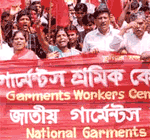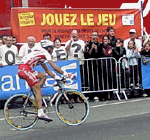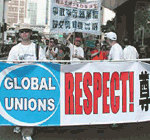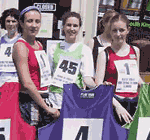The story so far…
"Play Fair at the Olympics", a campaign calling
for Olympic values of ethics and fair play to be applied
to the world's abused and exploited sportswear workers in
this Olympic year, has arrived in Athens, home of the Olympics.
What progress have we made so far?
The biggest anti-sweatshop mobilisation ever?
August 2004 - This has been a creative and highly
energetic global campaign with active participation of trade
unions and labour rights organisations from all around the
world, both in the consumer and the producer countries.
Hundreds of organisations and many top athletes have participated
in over 35 countries and more than half a million signatures
have been collected in support of the campaign. The extent
of actions at the sub-national level, which we estimate
at over 500 local events, has also been impressive, and
has helped contribute to extensive coverage on television,
radio and in the press all over the world.
The European Parliament passed a resolution supporting
the campaign aims, the British Parliament passed a motion
supporting the campaign, and a bill entitled "Play
Fair at the Olympics" was introduced in the US Congress.
Many members of several national parliaments also supported
the campaign.
This mobilisation has made it abundantly clear to the sportswear
sector that consumers and workers all share the same concerns
about the abuse and exploitation of workers which lie behind
the public face of much sportswear production.
Since March, the campaign has also contributed to increasing
the chances of successful resolution of a number of ongoing
disputes at sportswear suppliers, for example PT Busana
Prima Global producing for Lotto, PT Teodore producing for
Umbro and Reebok and PT Panarub producing for adidas
The start of an industry-wide solution?
We have succeeded in bringing seven major sportswear multinationals
around the table with the UN's International Labour Organisation
(ILO) to discuss our proposal for a "Programme of Work"
to take us from Athens to Beijing, designed to bring an
end to ongoing labour abuses in the sportswear industry.
The World Federation of the Sporting Goods Industry is
at present considering this joint programme of work and
we hope they will agree to work with us to implement it.
In July it established a new committee on "corporate
social responsibility" which will discuss our proposals
at their meeting in September. We will be publicly reporting
on progress (or lack of it).
Progress with individual companies:
Parallel to this industry-wide approach the campaign team
has met individually with 4 of the 7 highlighted companies
(Puma, Asics, Mizuno and Umbro) to discuss how to improve
their labour practices. In general the meetings were constructive.
Campaign representatives discussed the findings outlined
in the report, and clarified the campaign proposals.
In varying degrees the companies were moved to:
- address freedom of association issues via worker training,
to be organised in cooperation with Play Fair organisations
(Umbro & Puma)
- create space for direct dialogue with the International
Textile, Leather and Garment Workers' Federation regarding
workers' rights to form and join trade unions (notably Puma
and Umbro)
- develop more credible workplace investigations and complaints
procedures and engage directly with local stakeholders (notably
Puma and Umbro)
- pay greater attention to the impact of purchasing practices
on ethical programmes and share relevant information with
the campaign (Puma)
- evaluate and further develop their labour practice policies,
including supply chain mapping and wage criteria (notably
Asics and Mizuno)
- call upon the World Federation of the Sporting Goods
Industry to play a more active role in putting forward an
industry wide benchmark, specifically to facilitate progress
for the smaller companies such as Lotto, Mizuno and Asics.
- consider working with other active companies and non-governmental
organisations via the Fair Labor Association (Umbro has
applied for membership, Asics is considering this, Puma
had joined FLA prior to the campaign)
Formal responses from the sportswear industry to the
Play Fair "Programme of Work":
Fair Labour Association:
The FLA member companies (including Nike, Reebok, adidas
and Puma) jointly responded to the Programme of Work that
was presented by the campaign and confirmed the central
importance of promoting freedom of association and the need
for additional guidance for monitors on this issue, and
for developing remedial strategies that provide workers
with the awareness and the environment needed to form or
join organizations of their own choice. FLA companies will
also work to develop more effective complaints mechanisms
and new forms of dialogue and cooperation with local stakeholders.
Reebok:
Has welcomed campaign input on improving worker participation
initiatives. Is addressing freedom of association issues
by focusing on worker representation programmes in the field.
Actively pursuing a programme to prevent blacklisting of
trade union representatives in factories. Supports a sectoral
approach. Open to a role for the ILO in a sectoral approach.
Our campaign report helped in thinking on ways to improve
implementation of code of conduct. Welcomed future contacts.
Puma:
Was one of the first companies to invite the campaign
to its HQ to discuss the campaign report and explore collaboration.
Open to working with local organizations in support of internal
monitoring efforts. Working with a researcher to investigate
the connection between code implementation and purchasing
practices. Willing to discuss attendance at a regional consultation
and planning meeting in Asia in 2004.
Adidas:
Supports the proposal to hold a multi-stakeholder conference
in Asia including local suppliers, unions and NGOs. They
would welcome involvement of the ILO in facilitating such
a meeting. In sourcing countries, it is talking to government
officials about freedom of association issues.
Late responses:
Responding much later were Lotto, Fila and Kappa. Lotto
has proposed to take the lead in organising a meeting at
sector level in Italy, Fila has agreed to meet with the
campaign after the Athens Olympics and Kappa indicated a
willingness to organise a meeting.
An evaluation of the company responses, which can be found
here, provides
more detail on progress made by individual companies.
Greater transparency in supply chains:
In discussion with individual companies to clarify aspects
of the Olympics report, these companies have been willing
to share the locations of some of their suppliers with the
campaign allies. This is something few sportswear brands
have been willing to do in the past, and it increases the
possibility of monitoring workers' rights at the workplace.
Those companies who commit to the Fair Labor Association
will be opening up their supply chains to greater scrutiny,
which is a positive development.
Limited progress with the Olympic movement:
The International Olympic Committee (IOC), while categorically
refusing to take responsibility for workers' rights in the
Olympics sponsorship and licensing programmes at global,
national and games level, has nevertheless agreed that the
campaigns aims are in the spirit of the Olympic ideals of
fair play and ethics, and have agreed to participate in
the industry-wide dialogue to tackle workers' rights abuses
in the sportswear sector.
Many national Olympic committees and several athletes have
supported the campaign call for an end to the abuse and
exploitation of workers in the sportswear industry.
An opening for progress at the Winter Olympics?:
The Torino 2006 Winter Olympic Committee (TOROC) has adopted
a "Charter of Intents". The charter may be a contribution
to the defininition of ethical standards for global sporting
events. On this basis, TOROC has expressed an interest in
discussing with the campaign ways to improve social and
ethical values in sport in autumn 2004.
Points on which we are disappointed with the results
of the campaign
IOC still ducking and diving: The IOC is famous for its
arrogance and lack of accountability, and our experience
has done nothing to dispel this impression. The IOC, in
spite of expressed willingness to participate in sector
wide discussion, told us it is not prepared to discuss its
own responsibilities to workers through its billion dollar
global sponsorship and licensing programme.
It also denied its responsibility, in contradiction with
the Olympic charter, that it has a say in sponsorship arrangements
for national Olympic teams. While we have proposed very
little (basically strengthening licensing and sponsorship
complaints mechanisms vis-à-vis sportswear companies
and adding some workers' rights specific language to the
Olympic charter), the IOC has "stonewalled" the
campaign completely.
While making misleading statements in the media about our
campaign, any attempts to move the dialogue forward privately
were ignored. The IOC refused to accept the signatures of
half a million campaign supporters around the world calling
for change across the sportswear sector.
Individual companies nowhere near the finishing line: While
invidual companies have made some movement, as indicated
above, they need to go a lot further to lead to real sustainable
progress on the ground... Stories of worker abuse and exploitation
linked to every sports brand continue to emerge (eg. Recent
information released about Fila - case study available from
campaign representatives). They've jumped off the starting
block, but are nowhere near the finishing line, which they
will need to reach if workers lives are to improve by Beijing
2008...
Industry body not running with the ball: The World Federation
of the Sporting Goods Industry (WFSGI) did not in any meaningful
way respond to the contents of the campaign proposals, despite
ample opportunity to do so. Furthermore, it failed to give
any indication on how it will address the failure of most
of its members to follow its own basic code of labour practice.
To Conclude:
Moving the sweatshop debate forward:
We have, in one of the biggest ever mobilisations against
inhuman working conditions, powerfully conveyed, particularly
to some of the lesser known sportswear brands, that they
can no longer ignore the issue of workers' rights, or their
collective responsibility along with their suppliers for
labour abuses involving workers having their rights violated
and being forced to put in long hours of forced overtime
for poverty wages.
The campaign has won the debate that current practices
on individual corporate ethical codes of conduct have failed
to deliver their stated objective of averting labour abuses;
and that powerful brands need to integrate their fair labour
pledges into their purchasing practices in the global supply
chain.
Most significantly, we have pushed the sportswear industry
to begin discussing an industry-wide solution. We hope that
they seriously commit to this process and we will be publicly
reporting on progress. The IOC's refusal to play a pro-active
role in solving this problem is intensely disappointing,
but we will continue to campaign to ensure that the Olympic
ideal extends to the women and men who make the world's
sportswear.




